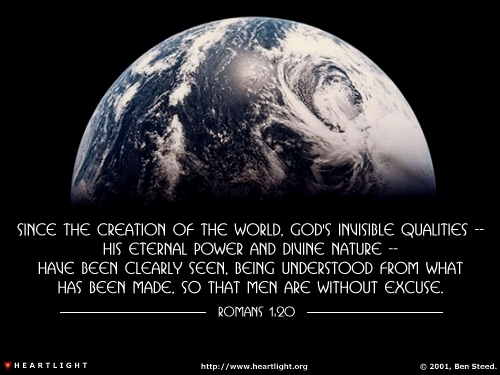
Worth more thought, from Bob Deffinbaugh's article on David mourning the loss of his first son by Bathsheba. I'm intrigued by his bend on things---that a person's response to the natural world and their understanding of God in that sphere is telling of their response to Him had they been given a fuller revelation. I'm not sure whether I agree or not---here it is:
"I believe the argument goes like this. God has revealed Himself to all men through nature. This revelation is not complete, and it does not include the good news of the forgiveness of sins through the substitutionary work of Christ on the cross of Calvary. Even so, a person’s response to what God has revealed to them in nature is a demonstration of how they would have responded if more had been revealed to them. Those who have received the revelation of God in nature have rejected it, twisting it into a religion of their own making, so that they worship God’s creation rather than God the Creator. " -Bob Deffinbaugh, "The Death of David's Son," Bible.org
In the past, I had viewed the response to the natural world as vague. How could a person look at the stars and not conclude that there are mysteries beyond them? How could a person look at the intricacies of the natural world--trees, plants, seasons, on the micro level--cells, atoms, DNA--and not see the planned nature ot it all. In this sense, I was thinking that the "Creation declares the glory of God." But Deffinbaugh's perception takes it beyond this, indicating that a person's response to "little" (a bare bones assessment of our planet and the natural world), reveals what this person's response would be to "much" (direct revelation into the heart of who Jesus is and why he came). Lots to think about here, but at first glance, I like the logic here.

No comments:
Post a Comment